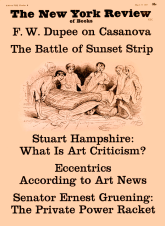In response to:
What Is History? from the December 15, 1966 issue
To the Editors:
Among those who admire the work of your reviewer, George Lichtheim, I number myself; yet I must point out that amidst all of the kind things that he says about my book, The Riddle of History [NYR, Dec 15, 1966], he makes a number of remarks that are not unkind, but are merely misguided.
For example, why does Mr. Lichtheim claim that because, at least on the surface, Marx was “notably fond of his father and had an uncommonly happy married life”—all points that I myself make—I am left “in a state of acute bewilderment.” Mr. Lichtheim’s dislike of psychoanalysis is well known; surely it is he who is acutely bewildered, sufficiently so as to ignore or suppress my further statement that “The point here is not that overt fondness for one’s father is necessarily proof of latent antagonism—far from it—but rather that latent antagonism may exist in spite of overt fondness; and only an open minded look at the total evidence can supply a useful answer.” Is Marx so sacrosanct that one may not ask, ever so speculatively, what his personality was like and what links there might be between his personality and his thought (incidentally, there is good evidence that the “happily married” Marx, who rightly railed against the bourgeois exploitation of women, was not above an affair with his own house servant, the loyal “Lenchen,” which produced an unacknowledged child)?
It is hardly surprising that, resentful of the use of psychoanalytic theories in dealing with historical figures, Mr. Lichtheim is consistent in dismissing out of hand the possibility that Freud might be a speculative philosopher of history. But surely, to dismiss Freud, as Mr. Lichtheim does, solely because of his alleged “naive commitment to Victorian liberalism and positivism” is to ignore precisely the original contribution of Freud to philosophy of history: his psychoanalytic theories. My thesis concerning Freud was as follows:
In his initial work, of course, Freud concerned himself mainly with the individual’s past, and he studied his subjects in the office and the clinic rather than in the historical world…. Then, boldly, Freud extrapolated his psychoanalytic findings to men in general and to the collective past. As part of this effort, he envisioned a new genesis, or origin, of man as a cultural animal, and then traced the path of humanity through time. He concerned himself with such topics as the psychological roots of religion and morality, the direction of history, and the means by which that direction is pursued. He analyzed the actors in the historical drama, both the hero and the masses who follow him…. Lastly, as he had analyzed individual neurosis in his clinical experience, so he tried to analyze the neurosis of the group in historical experience. The only cure for the latter (as for the former), according to Freud, is consciousness of the hitherto unconscious past. Thus, in his new version of an old subject, philosophy of history becomes both a diagnosis and a therapy for the ills of mankind.
On this, basis, why can we not call Freud, legitimately and meaningfully, a philosopher of history? I submit that, to one not unalterably opposed to psychoanalysis per se, or to Freud because he is an American culture hero, an open look at the evidence for Freud’s contribution to philosophy of history is in order.
Bruce Mazlish
Massachusetts Institute of Technology
Cambridge, Massachusetts
George Lichtheim replies:
I am sorry to have hurt Mr. Mazlish’s feelings, but he ought not to suggest that I am against Freud—a great figure and a private hero of mine since the age of fifteen. What I am against is not psychoanalysis, but its occasional misuse on the part of sociologists and historians. Was it not one of these sages who discovered that if Russian babies had been less frequently potted, there would have been no revolution? Mr. Mazlish, to do him justice, does not indulge in this kind of nonsense, but his work suggests that he is not wholly immune to the infection.
That Freud was no “philosopher of history” is a conclusion which can be demonstrated with reasonable certainty by considering what history is about. He had nothing whatever to say about it, though he did have something to say about anthropology. The two must not be confused. Those modern anthropologists who are most deeply influenced by Freud are also, for good reason, most indifferent to history and its problems.
As for Marx (whose happy marriage Mr. Mazlish in his book concedes only with the greatest reluctance), it is quite true that he had an illegitimate child. So did Hegel. So did Dickens. So did Victor Hugo. It was a bourgeois habit. Its relevance escapes me. And I wonder if Mr. Mazlish would have brought it up if Marx had been more respectful of the liberal pieties.
This Issue
March 9, 1967



